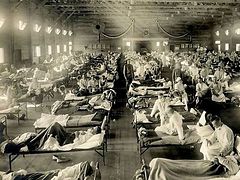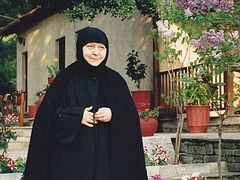A litmus test
Before Pascha I talked with a parishioner of our church. We worried whether or not we would be able to get to church on Pascha and how we would attend services and lead a normal spiritual life during the pandemic. During our talk he said, “This Pascha is a litmus test. It will separate the sheep from the goats among us.” He meant that “true Orthodox” were those who despite all the bans, police cordons and the risk of infection would come to church on Pascha, stand with lighted candles and cry joyfully, “Christ Is Risen!”; and those who would stay at home were the “goats”, who only seem to be Orthodox but in fact are “as good as milk from a billy goat”, and all their “Christ Is Risen!” greetings, prayers, tears and joy without church would not be real. When I asked him whether he was ready to assume responsibility in case he infected his loved ones and other innocent people or even caused their deaths, he answered simply, “We are all in God’s hands!”
I celebrated the Radiant Resurrection of Christ with my family at home and I don’t regret it. I didn’t experience less joy than in the years when I had celebrated it at the Monastery of St. Paphnutius of Borovsk with its brethren. But man proposes and God disposes. Handsome is as handsome does, as the saying goes. You can be despondent in Jerusalem and rejoice in God in a dark forest. After all, the main distinctive attribute of believers in our Lord Jesus Christ is love for God and their neighbors—on these two commandments hang all the law and the prophets (Mt. 22:40)—rather than going to church on Sundays and the feasts and knowing the prayers and canons by heart. The Lord Himself said this to the Pharisees who were tempting Him. I believe that if I get in trouble and can’t go to church, my Lord and Shepherd will put aside all His work and ninety-nine percent of His sheep and will hurry to me to share the meal with me, bless my house and make Himself an altar out of my heart so that nothing could ever separate us.
When you are afraid
In the evening my Orthodox acquaintance from Kamyshlov [a town in the Sverdlovsk region in the Ural federative district; its administrative center is Ekaterinburg.—Trans.] called me:
“Talk to me! I am terrified!”
“What has happened?”
“Don’t you know? A group of 300 shift workers from Murmansk have been brought to our ‘Obukhovsky’ health resort nearby… It has turned out that some of them contracted coronavirus! Can you imagine? A woman from village Obukhovskoye has told me that several workers escaped the quarantine, went to town to get food and used public transport. Of course, later they were put under the coronavirus quarantine again, but they may have infected many people! Our town is small and sleepy with many old women among its residents! As I think about this, I can’t fall asleep! I must take the garbage out but I am afraid to go outside!”
I replied:
“Believing rumors in these troubled times should be beneath your dignity! You shouldn’t care about such hearsay! Besides, these people didn’t fall out of the skies: they are our fellow-countrymen, Russian people, and they are not guilty of what has befallen them! If you think that we will wait here quietly, hiding at home, and then all will get back to normal by itself, then you are wrong! People go to Ekaterinburg, to Byumen and God knows where! And there are some infected people among locals, too. It is our common tragedy and we can only overcome it together.
“Be sure to wash your hands as often as possible, don’t forget to put on a mask before you go out and try to ignore rumors! Pray when you are scared! There is no sense in listening to your fears!
“After all, you believe in God and know that it is impossible to chase away darkness with darkness. The more you think of your fears and give way to them the more depressed you’ll feel! You need light in your soul! And this Light is our Lord Jesus Christ! Complain about your fears to Christ and the Holy Theotokos that They will deliver you from them! If you can’t pray, listen to your favorite pop singers or any music you enjoy… Or read a good book… You have a whole wall unit filled with books! As my granny used to say, ‘Wash the floor in your house, and all kinds of nonsense will be put out of your head!’
“In the evening recall all the good things that happened to you during the day and give thanks to God for everything: that you are alive, that the spring has come, that birds are singing, that you can phone your friends… Maybe your fears will abate.”
After our conversation I marveled—just before her call I had been out of my wits with worry, thinking: “Is this really happening to all of us?”, but now, while I was consoling her, I forgot all my fears! This is what always happens to us: if we do something sincerely for others, the Lord sends solace to our souls.
Tears of gratitude
A ninety-three-year-old man recovered from coronavirus in an Italian hospital. The doctors tried to treat him for some time and then said they needed to put him onto a ventilator, for which he had to pay €5,000 for twenty-four hours of this complex, costly machine! When the old man heard this, he burst out sobbing bitterly. The physician in charge tried his best to console the elderly patient, saying that when it comes to saving your life you can pay such an enormous sum. But the man answered through his tears that he was not weeping because of the exorbitant price.
He said:
“I am not weeping because of the money I have to pay. Glory to God, I have this amount and I can afford to cover my treatment. I am crying because by the mercy of God I have breathed the air for ninety-three years without ever paying for this. You say one day of this mechanical ventilator’s work will cost €5,000? But do you know how much I owe to the Lord for all my long life? And I have never thanked Him for this!”
And after these words the doctors who were with him burst out crying too.
Hot Georgian lavash bread
On the way to work I dropped in at a Georgian bakery by the streetcar stop. Though it looks like an ordinary kiosk by a big shopping center, as you go inside you feel as if you were in a real Georgian bakery in Digomi—the one I would run to every morning while on vacation at my grandparents’. We always needed a lot of bread: for grandpa who would work in the garden all day long; for dad who would come home for lunch, rest a little, take granny’s cooking with bread and leave again till the evening; and for the rest of our household, including four grandchildren. When you scurry around in the streets from morning to late evening, play football with your friends, climb mountains, bathe in the river, you get hungry as a hunter! You run back home and have no time to wait till granny has made lunch because your friends are waiting for you. So you take some lavash bread and whatever you can find in the Georgian kitchen and run back to the street.
It is best to go to buy lavash bread in the morning when it has just been baked and taken out of the oven. It’s really delicious then! You eat it with a scarlet tomato and Georgian suluguni cheese, and it seems there is nothing tastier in the world! In order to buy it granny would wake me up at the first cockcrow. I would run to wash my face in the garden, turn on the faucet with ice-cold water, splash about, beside myself with delight and the cold. Then I would walk over the cobblestone pavements, watch the shepherd driving his flock uphill, shaggy dogs running around, a truck standing by the wayside and letting the others pass, our neighbor taking his grapes to the market, and his wife hanging hot red peppers on the balcony. These peppers with their inimitable aroma and pungency are the king of the Georgian cuisine and they grow only in Georgia. Without them no adjika [a Georgian hot, spicy yet subtly flavored sauce used for flavoring food.—Trans.] or sauce will be any good. They are added into many dishes, and their taste becomes royal!
And there were people in front of the kiosk, impatient to get some fresh bread and go to work. Everybody was smiling at me and I was smiling at everybody because a new day was beginning. If you have fresh lavash with you, you shouldn’t worry about lunch. Even if there is nothing else on the table, you pour some traditional Georgian satsebeli or cherry plum (tkemali) sauce into a bowl and dip the fresh lavash into it—it will be tasty and rich. You won’t have the same effect with ordinary bread…
I entered the bakery and asked, “Do you have any fresh shoti [a kind of traditional Georgian bread made of white flour and shaped like a canoe.—Trans.]?” “Fresh” means what has just been taken out of the oven, but yesterday’s bread is half-price. At first you are surprised at this attitude, but then you understand that they value their quality and they respect you as well. The polite shop assistant answered, “It hasn’t been baked yet, it’s too early! Would you like some hot lavash? We will get out some for you!” I said, “Yes, certainly!” Who could refuse freshly baked lavash?
The baker adroitly gripped the piping hot, brownish ring out of the oven and dropped it onto a wooden board on the table. The shop assistant gently wrapped it in paper (as if it were a baby) to keep the lavash from getting wet as it cooled down, put it into a paper bag and offered it to me with a smile. The Georgian bakers smiled at parting:
“Have a nice day! May God keep you!”
“May God keep you too!”
The pleasant smell of my lavash spread all over the streetcar. My fellow-passengers would cast an occasional glance at my package. On the face of it, it was nothing special: I had only bought some bread… There was joy in my heart—though the quarantine and the virus are still with us, the sun rises, it is warm outside, and trees are in leaf. And those people had baked a good quantity of fresh bread; they smiled, wished me a nice day so that I could spend it with God. Can we become gloomy after that?





